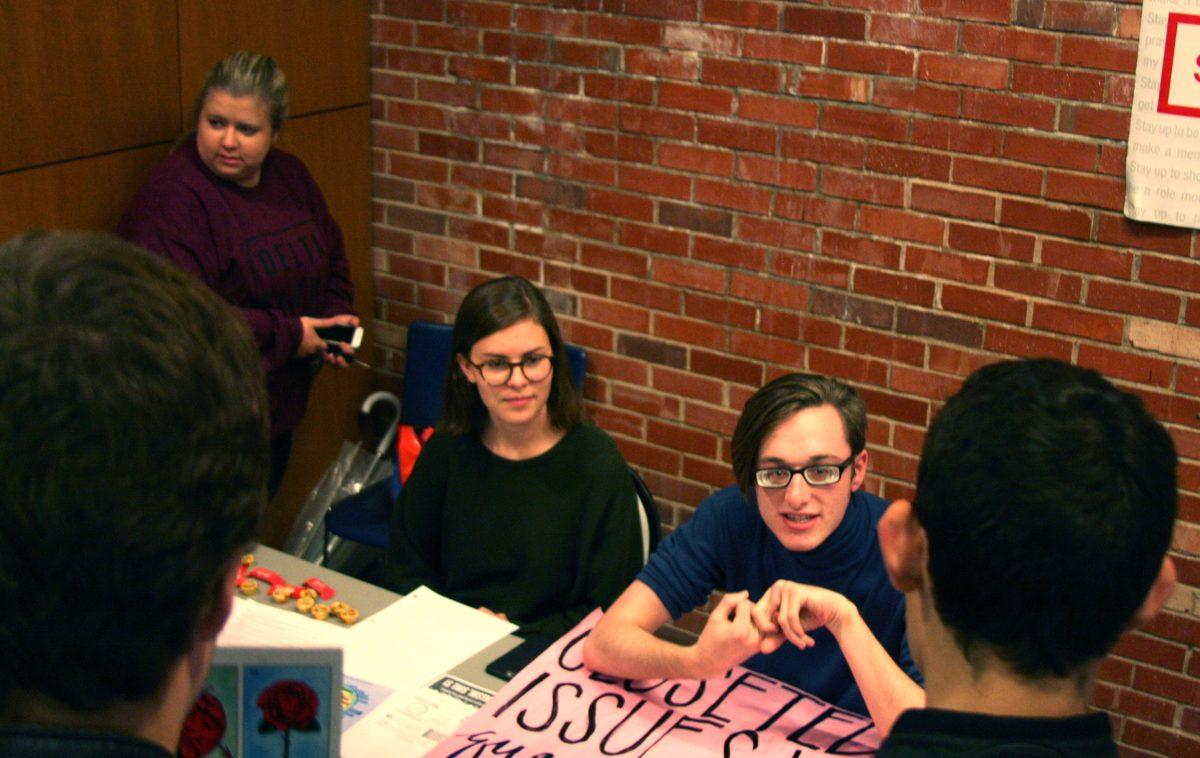Representatives of Drake University’s LGBT organizations advertised the issues surrounding the prison industrial complex (PIC) in conjunction with Closeted Issues Week on campus.
“The prison industrial complex is the system within federal prisons and the components that support federal prisons in incarcerating people that then make a profit off of that,” said President of One Voice Paxton Gillespie.
Members of One Voice distributed information when tabling outside of Hubbell Dining Hall on Monday and Wednesday. They also attended the Social Justice Panel held in Carpenter Hall last Thursday evening. All events advocated for immediate recognition and reform for the high rates of abuse against transgender prisoners.
More specifically, the PIC refers to the “overlapping interests of government and industry that use surveillance, policing and imprisonment as solutions to economic, social and political problems,” according to Critical Resistance, an organization dedicated to dismantling the system in question.
“It’s an industrial complex because it’s not just federal prisons,” said Mary Traxler, vice president of One Voice and a Polk County Jail volunteer. “It’s not just prisons in general. It’s the corporations that give them money. It’s also the policing system and everything that goes into that. It’s also local governments. It’s also taxes that go towards local governments. It’s the education of local communities, economics.”
The prison industrial complex begins with the privatization of prison policies. In the interest of cost reduction, state and local governments contractually outsource their public jails and prisons to money-making businesses.
Wealthy corporations such as the GEO group and Corrections Corp of America (CCA) saw investment potential and offered cost efficient prison management.
In exchange, however, states would have to maintain a consistent occupancy rate of 90 percent, according to John Whitehead, President of the Rutherford Institute, who wrote for the Huffington Post on the subject in 2012.
Inmates in American prisons are often charged a room and board fee to cover excess costs of meals, clothing and building maintenance. According to Traxler, Polk County Jail charges $65 a day per prisoner.
Officials must fill a quota, one that does not fluctuate with oscillating crime rates. So when the supply is high, one must create the demand. This can lead to the unnecessary incarceration of people with comparatively petty crimes.
Forty-six percent of inmates are currently incarcerated because of drug abuse, according to the Federal Bureau of Prisons.
“(Black and Pink) is an organization that pushes for abolition of prisons as an institution and the discovery of a new way that focuses on rehabilitation and healing for people who are committing crimes,” Gillespie said. “The reason the majority of people are committing crimes is because of a system that forces them to, because they are poor, because they are black and don’t have other options.”
The PIC is a multifaceted and influential industry, one that exposes a multitude of negative social biases.
“We are here at the table today and this whole week trying to focus on the prison industrial complex as it relates to the queer community and how different experiences in the prison industrial complex can be for people who are queer, and often-times much worse for queer people of color,” Traxler said.
The group made sure to highlight the concept that the treatment of transgender individuals in prisons is much harsher than that received by prisoners otherwise identified.
A survey of 1,118 prisoners conducted by Black and Pink in 2015 suggested that 85 percent of imprisoned LGBTQ individuals were placed in solitary confinement at some point during their sentence.
They were also over six times more likely than the general incarcerated population to be sexually assaulted.
“You’ll notice that the rates of education they receive are ridiculously low,” Gillespie said. “A majority of trans people have been placed in solitary confinement for punishment, and the rates of abuse and trauma that they face in prison are exponentially higher than the rates of specifically straight cisgender identified prisoners experience. This is specifically happening to queer people of color.”
This issue receives minimal political attention, specifically in Iowa because it is one of three states that permanently renounces a convicted felon’s right to vote.
“The voices of people who have been imprisoned are literally removed from our political sphere,” Gillespie said. “So there is no way for them within democracy to say, ‘Hey, we need to fix this system.’”
Impassioned by the topic, One Voice presented it to the student population for Closeted Issues Week, a three-year Drake tradition focused on public surfacing of minimally recognized subjects.
“Polk County Jail is 15 minutes away from this school, and this is our community,” Traxler said. “It’s easy to think about how the prison industrial complex is this really grand big scheme which is impossible to take down, which is not wrong. But this is happening to people in our communities who share this same city with us, who live next to us, who have children in our school systems, who are in our community and trying to be okay.”
One Voice pushes for radical prison reform involving the abolishment of systematic punitive measures and instead adopting more constructive methods of criminal rehabilitation.
“It costs four times as much to incarcerate someone than it is to educate them,” Traxler said. “Thirty-nine percent of LGBTQ prisoners have not graduated high school. Eduction is a really big piece, which is cheaper than incarcerating (individuals) and would address the problematic source.”
Both Traxler and Gillespie encourage activism and awareness of the PIC among Drake students.
“Drake touts itself as a very politically active campus,” Gillespie said. “The University brags about how students are politically active all the time. But a lot of the issues that are being focused on on our campus are highlighting the experiences of students on our campus and are marginalizing other experiences.”







